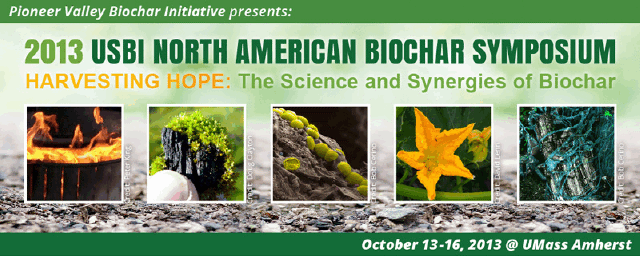Scale, Sales & Marketing
Global Climate Change & Biochar
Rivka Fidel presentation
SSM Session 1 Hamill.ppsx (3946 kB)
Doris Hamill presentation
Location
CC 162
Start Date
14-10-2013 10:00 AM
End Date
14-10-2013 11:20 AM
Session Description
Biochar and Biofuels, Getting the Balance Right - Doris Hamil, NASA
Recent studies have confirmed that converting biomass to biochar can have net advantages to the global environment over converting the same biomass to biofuels. This presentation will summarize the conclusions of recent papers describing the situations in which maximizing biochar production is favored over conversion to biofuels. When coproduction of biochar and biofuels is indicated by local conditions, an approach is described to determining the optimum biofuels, production parameters, and fuel-char mix.
Biochar and the Priming Effect on SOC – T. Whitman, Cornell University
Biochar (BC) plays a critical but poorly understood role in the global carbon cycle. Because it is a highly stable form of carbon compared to the original biomass from which it is produced, its production and management has been proposed as a technology for reducing atmospheric CO2 stocks, which contribute to climate change. However, uncertainties remain regarding the effect of its application on the decomposition rate of existing soil organic carbon (SOC) stocks. BC additions may cause SOC to decompose at a different rate than it would without the BC application – an effect termed “priming”. We aim to determine whether the relative amounts of labile SOC and dissolved BC (DBC) can be used to predict the magnitude and direction of “priming” in a soil system. This study will investigate potential mechanisms for short-term priming in a 5-week incubation study. The BC is produced at 325°C from 13C-labelled maple twigs, which will facilitate distinguishing the source of soil CO2 emissions using an isotopic partitioning approach. “Labile” SOC levels will be adjusted by incubating soils for varying durations. DBC levels will be adjusted by extracting DBC from bulk BC and then returning it to the bulk BC at varying rates. We predict that the greatest negative priming effects will be seen where there is low SOC and high DBC, as DBC may be used preferentially as a substrate by microbes in SOC-limited soils. This research will further understanding of the critical interactions between BC and SOC while also informing policy decisions regarding BC production and application to soils for carbon sequestration.
Biochar Impact on Soil related GHG emissions– R. Fidel, Iowa State
This research is focused on the relationship between biochar’s properties and biochar’s effect on GHG emissions. Specifically, the biochar chemical properties relevant to biochar-soil interactions will be quantified, and then these properties will be related to changes in GHG emissions that occur following the application of biochar to soil in laboratory incubations and under field conditions. The goals of this project are to (1) quantify the organic and inorganic properties of different biochars and relate these properties to biochar production conditions, (2) quantify the impact of biochar properties on GHG emissions from diverse soils, (3) identify mechanisms by which biochar properties influence GHG emissions from soils, and (4) quantify the effects of biochar amendments, agro-ecosystem diversity and soil type on GHG emissions from soils in the field. This research project will be conducted in three phases: an analysis of biochar properties, a laboratory incubation experiment, and a field study.
Global Climate Change & Biochar
CC 162
Biochar and Biofuels, Getting the Balance Right - Doris Hamil, NASA
Recent studies have confirmed that converting biomass to biochar can have net advantages to the global environment over converting the same biomass to biofuels. This presentation will summarize the conclusions of recent papers describing the situations in which maximizing biochar production is favored over conversion to biofuels. When coproduction of biochar and biofuels is indicated by local conditions, an approach is described to determining the optimum biofuels, production parameters, and fuel-char mix.
Biochar and the Priming Effect on SOC – T. Whitman, Cornell University
Biochar (BC) plays a critical but poorly understood role in the global carbon cycle. Because it is a highly stable form of carbon compared to the original biomass from which it is produced, its production and management has been proposed as a technology for reducing atmospheric CO2 stocks, which contribute to climate change. However, uncertainties remain regarding the effect of its application on the decomposition rate of existing soil organic carbon (SOC) stocks. BC additions may cause SOC to decompose at a different rate than it would without the BC application – an effect termed “priming”. We aim to determine whether the relative amounts of labile SOC and dissolved BC (DBC) can be used to predict the magnitude and direction of “priming” in a soil system. This study will investigate potential mechanisms for short-term priming in a 5-week incubation study. The BC is produced at 325°C from 13C-labelled maple twigs, which will facilitate distinguishing the source of soil CO2 emissions using an isotopic partitioning approach. “Labile” SOC levels will be adjusted by incubating soils for varying durations. DBC levels will be adjusted by extracting DBC from bulk BC and then returning it to the bulk BC at varying rates. We predict that the greatest negative priming effects will be seen where there is low SOC and high DBC, as DBC may be used preferentially as a substrate by microbes in SOC-limited soils. This research will further understanding of the critical interactions between BC and SOC while also informing policy decisions regarding BC production and application to soils for carbon sequestration.
Biochar Impact on Soil related GHG emissions– R. Fidel, Iowa State
This research is focused on the relationship between biochar’s properties and biochar’s effect on GHG emissions. Specifically, the biochar chemical properties relevant to biochar-soil interactions will be quantified, and then these properties will be related to changes in GHG emissions that occur following the application of biochar to soil in laboratory incubations and under field conditions. The goals of this project are to (1) quantify the organic and inorganic properties of different biochars and relate these properties to biochar production conditions, (2) quantify the impact of biochar properties on GHG emissions from diverse soils, (3) identify mechanisms by which biochar properties influence GHG emissions from soils, and (4) quantify the effects of biochar amendments, agro-ecosystem diversity and soil type on GHG emissions from soils in the field. This research project will be conducted in three phases: an analysis of biochar properties, a laboratory incubation experiment, and a field study.


